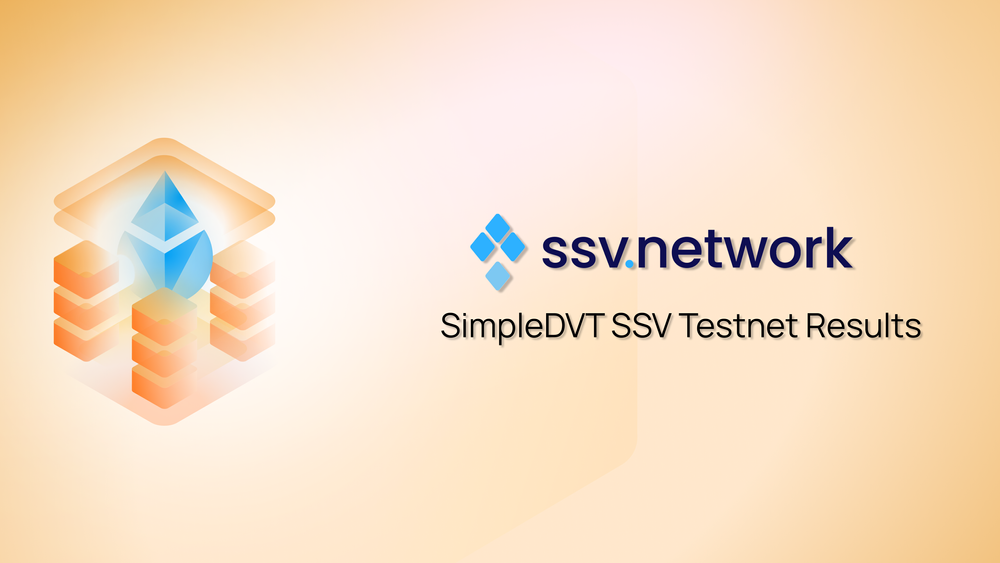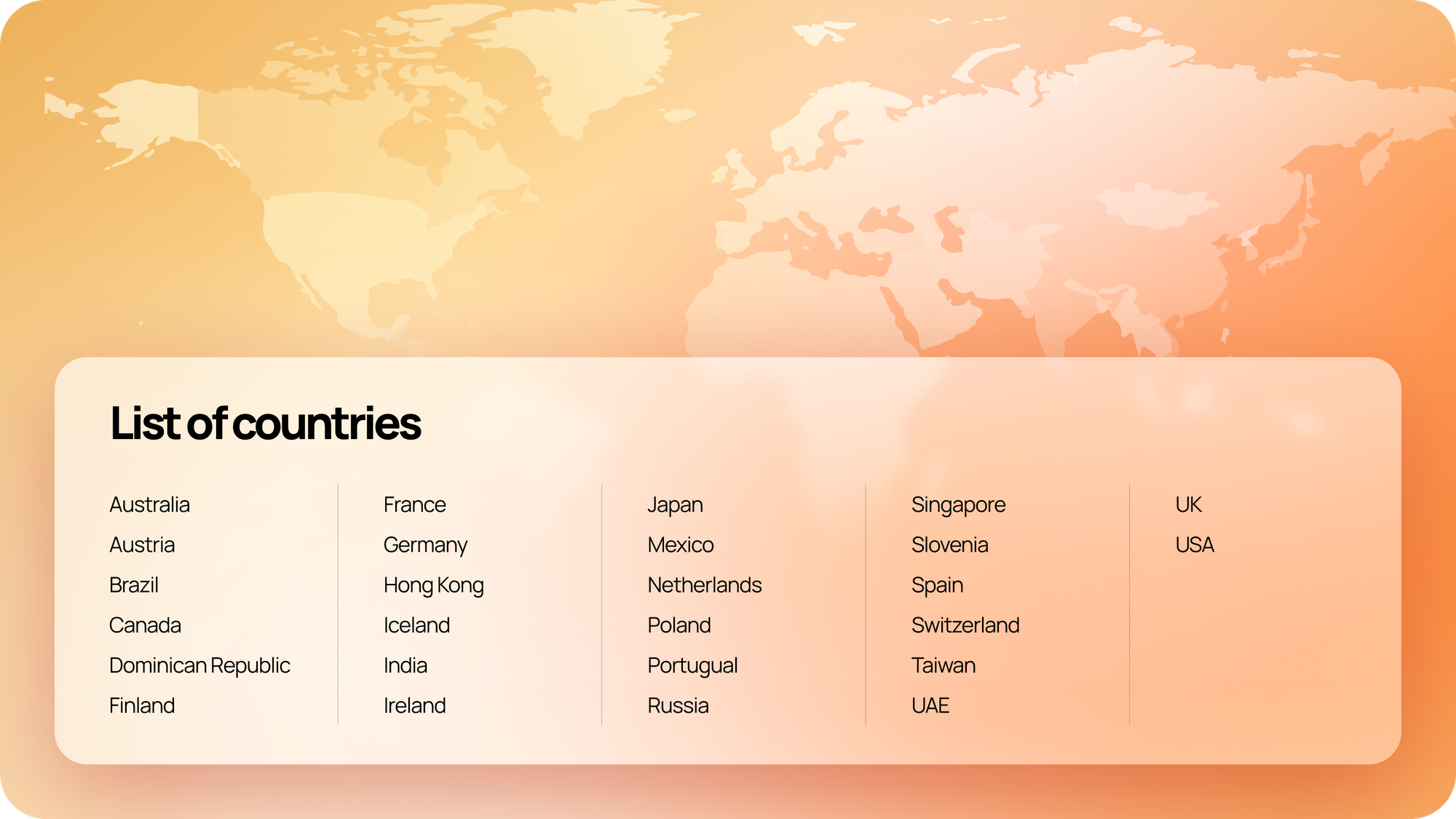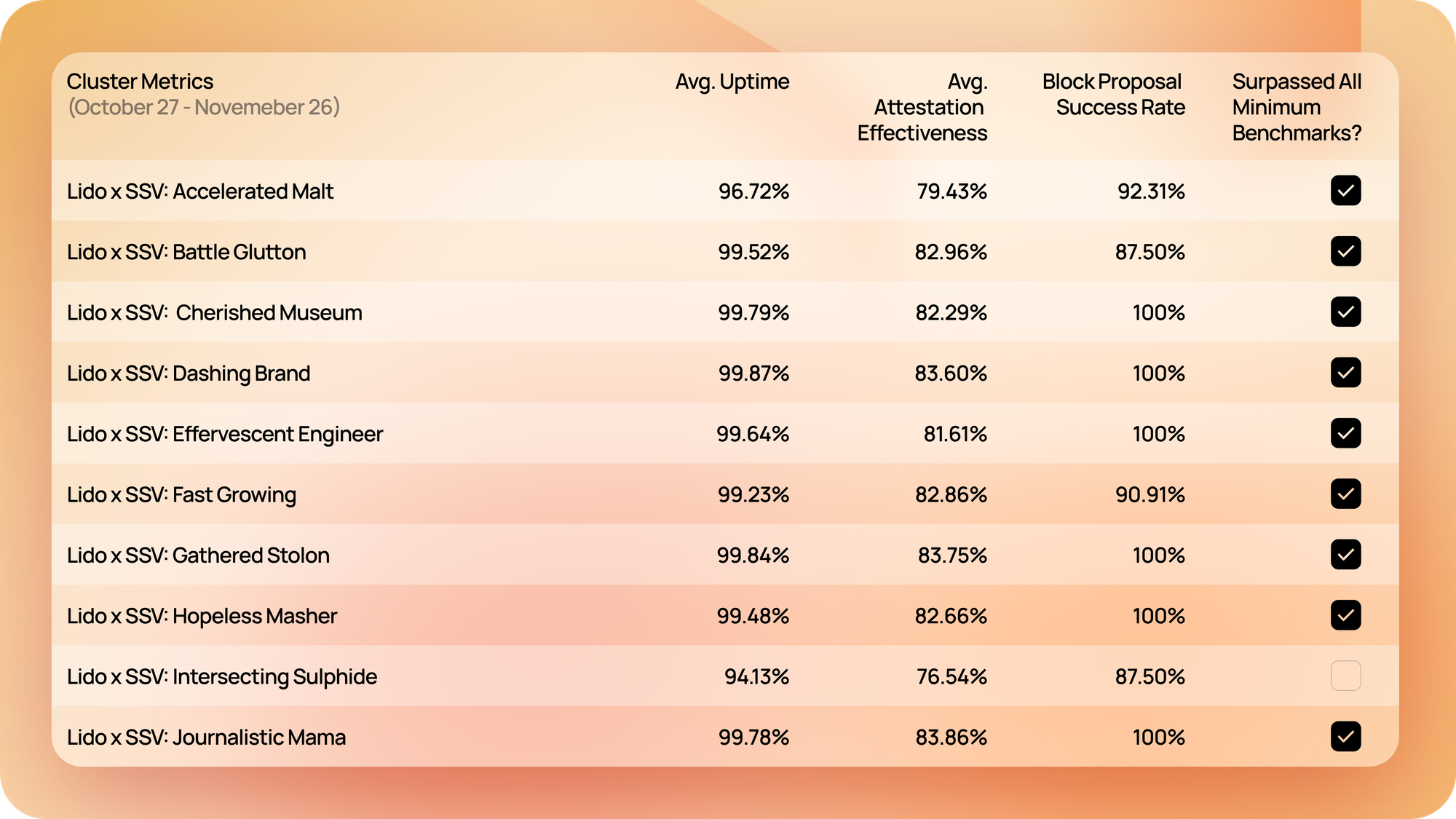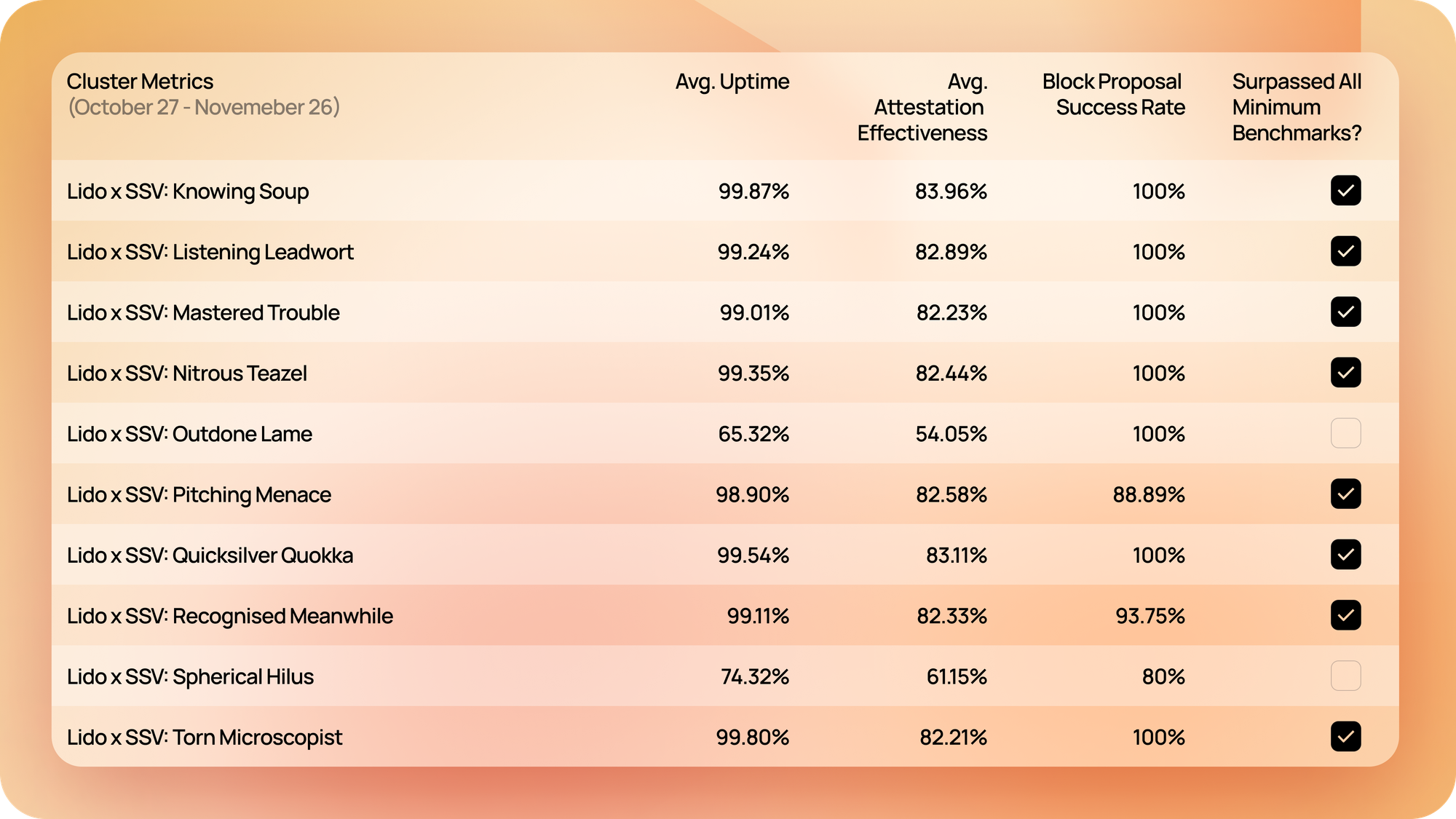Simple DVT: SSV Testnet #4 Results

The final phase of the Lido x SSV Simple DVT testnet ended, with the validator set surpassing all of the minimum aggregate requirements to be considered eligible to move to mainnet!
This was the 4th Lido x SSV trial enabling Node Operators to use the Lido protocol on Holesky to run validators with SSV-based Distributed Validator Technology (DVT).
Following the success of the testnet, a proposal has also been made on the research forums to the DAO with the suggested list of participants to move forward to mainnet for SDVT SSV Cohort 3.
About Simple DVT
Today, the Simple DVT Module (SDVTM) for Lido on Ethereum consists of a total of 67 clusters, with 36 normal Obol Clusters and 21 normal SSV clusters. Additionally, there are 5 Simple DVT Super Clusters with the allowance to run more validators per cluster. For more information on Super Clusters, read the forum post here.
Overall, the SDVTM clusters are running over 5,400 validators and are expected to reach ~ 12,000 or 4% of the Lido on Ethereum share by Q2 2025. Furthermore, to date, Simple DVT has led to the onboarding of 235 net-new Node Operators to Lido on Ethereum, including 144 solo and community stakers. Following this onboarding round, over 300 net-new Node Operators are expected to utilize the Lido on Ethereum protocol to run validators through the Simple DVT Module.
Another initiative related to the Simple DVT Module is the Decentralized Validator Vault, implemented by Mellow with provider incentives from SSV Network, Obol, and Mellow. Its goal is to boost the number of Distributed Validators (DVs) active in the Simple DVT Module, advance the decentralization and resilience of the Lido on Ethereum node operator set, improve network security, and allow stakers to receive DVT provider incentives in the form of points. For more details, please read the blog post here.
Lido & SSV Testnet: Overview
Participant Distribution
The 4th Lido x SSV trial started in August 2024 on the Holesky testnet, with 192 total participants including over 53 solo stakers, 28 community stakers, as well as 80+ and professional node operators. Participants were split into 24 clusters of 7, with an effort to minimize geographic related latency and achieve a diversity of infrastructure types (e.g. bare metal servers, home machines, and public cloud). At the aggregate level, participants ran nodes from 27 countries across North & South America, Europe, Asia, Africa and Australia.

The Process
Participating clusters started the process by submitting a verified “Individual Manager Address'', used for signing messages in the Protofire Safe and SSV webapp, and an optional “Individual Reward Address'' that participants could choose to receive validator rewards in lieu of their Individual Manager Address.
Next, clusters proceeded with choosing a “Cluster Coordinator”, a participant that would be responsible for creating their Safe multi-sig and initializing the Distributed Key Generation (DKG) ceremony for each cluster. Each cluster’s SAFE consisted of a 5/7 threshold, and represented their cluster in the Lido Node Operator registry on Holesky.
Once completed, Cluster Coordinators created their respective cluster Safes and their Node Operator entries were created. Thus began the node setup process. In SSV, each participant is responsible for registering as an Operator on the SSV Network, running an SSV Node (which also serves as their validator client), and operating a DKG Node.
Once the setup was complete, the Cluster Coordinator initiated the DKG ceremony. After the ceremony was successful, the Coordinator started the process to register the validators to the SSV smart contracts for their cluster participants to sign in the Safe, which also included setting a spend approval for SSV tokens and updating of the cluster Fee Recipient to the Lido Execution Layer Rewards Vault on Holesky.
When the clusters completed the signing process and verified the correct validators were registered to their respective clusters, they proceeded with starting the process of submitting their validator keys to the Lido Node Operator registry, which then also required verification from the cluster participants.
Soon after, the Lido Simple DVT Module Committee on Holesky raised the key limits for the clusters, and an initial 20 validators were activated. During the following weeks, performance metrics for Uptime and Attestation Effectiveness showed generally promising results, and the clusters proceeded to register and submit 80 additional validators, bringing the total to 100 active validators for most clusters. To test running a larger number of validators, two of the clusters reached 420 active validators.
During the trial, the SSV Network underwent a major protocol upgrade via hard fork, known as the Alan Fork. This fork introduced improvements to node resource utilization, bandwidth consumption, and other optimizations. In preparation for the testnet fork on October 8th, cluster participants needed to update their nodes to the latest version of the SSV node.
Due to some last minute updates, the SSV Labs team released a new node version on the eve of the scheduled fork. This required participants to react quickly and update their nodes to the new version.
After the fork, an analysis by the SSV Labs team confirmed that none of the clusters were negatively impacted and that their performance remained unaffected. The analysis showed significant reductions in resource usage for machines running the SSV nodes:
- CPU usage: decreased by 75.62%
- RAM usage: decreased by 23.19%
- Receive bandwidth: decreased by 71.26%
- Transmit bandwidth: decreased by 70.47%
Finally, to conclude the trial, the clusters exited their validators and successfully tested the rewards claiming flow.
Performance Results
SSV Cluster Aggregate Results
As seen in the image above, the aggregate metrics for this Lido x SSV trial surpassed all of the Minimum Testnet Success Characteristics outlined in the Simple DVT Module Proposal, with 97.04% Uptime, 80.36% Attestation Effectiveness, and a 92.86% Block Proposal Success Rate (all metrics per Rated). In addition, outside of Block Proposals, SSV cluster performance also surpassed the tracked aggregate average for the entire Holesky network.
Cluster Results
At the cluster level, 18/24 clusters surpassed the Uptime Benchmark, 20/24 surpassed the Attestation Effectiveness benchmark, and 24/24 surpassed the Block Proposal Success rate benchmark.
All in, 75% of clusters, or 18/24, surpassed all of the observed required benchmarks.
Participant Performance
While specific participant performance will not be discussed in this blog post, there is an important point to note: participants in clusters that did not reach the minimum performance benchmarks are not automatically excluded from moving forward to mainnet.
In many cases, these clusters contained a majority of Node Operators who were highly cooperative within their clusters, responsive to updates and testing requirements, and whose nodes were performant.



Path to Mainnet
Following the posting of the LNOSG suggested shortlist of participants to the forums, the DAO will have one week to discuss the proposal and state any objections. If no objections arise, clusters will begin the coordination process and the Simple DVT Module Committee will commence Easy Track motions (which can be rejected by LDO token holders) to register the clusters on the Lido Simple DVT Module registry.
At this time, no further Simple DVT Module onboardings are scheduled, but ultimately this is up to the community to determine. The Simple DVT Module has demonstrated that the use of DVT is scalable on mainnet and successfully onboarded the first solo and community stakers to the Lido protocol.
With the addition of SSV Cohort 3, by February 2025 the Lido protocol is on track to enable over 500 independent Node Operators to run validators across the Simple DVT Module, Community Staking Module, and Curated Module.
Appendix: SSV Testnet #4 Participants
- Cohort 1: AXBLOX, Block Farms, pipsqueecs, ProofGroup, spud, Stefan, Tessier-Hashpool
- Cohort 2: atomicwhale, Blockshard, DenverParaFlyer, Fiews, rs3der, Stake DxPool, Stakecat
- Cohort 3: Ben Chan, ContributionDAO, Girnaar Nodes, kongheyfatchoy, p10node, rick, TWM
- Cohort 4: BlockNth, Blockblaz, ChainUp, Kingnodes, Next Finance Tech, rylos, Uwium
- Cohort 5: AussieStake, KudasaiJP, LinkRiver, mmthellman, Nodeinfra, Provalidator, Tané
- Cohort 6: 0NEinfra, CrisOG, enti, Garik, StableLab, Sub7 Security, Thoma Technologies LLC
- Cohort 7: AstroCat, CryptoBoru, Cryptonative Systems, GRASSETS TECH, Mrs_ml, Restake, Viacheslav Smirnov
- Cohort 8: baoquoc1998, CertHum, glcstaked, Igor, kotiki, lux8.net, STAKR.space
- Cohort 9: Andersen, anvel, ChainLabo, ChainOps Russia, CryptoCrew Validators, flisko, natalia_256
- Cohort 10: Attestant BVI, humpyy.eth, Kukis Global, NORTHSTAKE, RHINO, RockLogic GmbH, TXTiger
- Cohort 11: bountyblok, jeffjack, MasterYarik, Nodes International, StakeCat, StakeValid, stufez
- Cohort 12: alexeyshkittin, Artifact Systems, crimson1, Natalia, Piconbello, ThomasBlock.io, tommylowe90
- Cohort 13: chainwizard94, ContributionDAO, Daniil, Khanhwizardpa | p10node, stakefish, Stake Village, Validatrium
- Cohort 14: Anvil Finance, Blockops Network, LinkPool, Ponkila Oy, Professor Parpinsons, Staking4All, zheli
- Cohort 15: Bablovcoin, claire1284, GRASSETS TECH, rodion007, starnodesxyz, Syncnode, ValiDAO
- Cohort 16: cgero.eth, efa1994, Imperator.co, KT10, Mach5 Validators, smartinvest.eth, yura_zp
- Cohort 17: Amamu, Albinos, khanami.eth, leadparachutes, NodeSoda, Stakesaurus, ValidBlocks
- Cohort 18: 5quat, AJ | Alex Ma, BlockNth, Ethernodes, igorzp60, Maxim Tarasenko, Provalidator
- Cohort 19: 79anvi, BlockWrangler, DELIGHT LABS, dimkatoy, marisarze, Oneplus, zdec6kit
- Cohort 20: antotg, ethdog, Imperator.co, minibella333, pWse, ShalomGH, Shimbob | Stakecat
- Cohort 21: Gorbako, Jirzy, mrman08667, nova, starArsonist, StakeCat, vinsystems
- Cohort 22: Chainbase Staking, CryptoCrew, DeeNode, Herman | IdeaSoft, pav3g, SyncX, swiftstaking
- Cohort 23: 0xDonPepe, ariiellus, Brichis, Chuy, CryptoReuMD, Karen84, Salvador
- Cohort 24: AlexIT, BlockPI Network, hereWeGo, luciolaKami, Monika, Openbitlab, Shadon